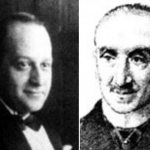Political theology, religious fundamentalism and modern politics
Political theology, religious fundamentalism and modern politics Marilena chauí In order to define a single and indivisible sovereign political power, Western modernity needed to separate itself from the ecclesiastical power that impeded this unity and indivisibility. Consequently, public expressions of religion were placed under the control of rulers and intimate expressions were relegated to the […]





